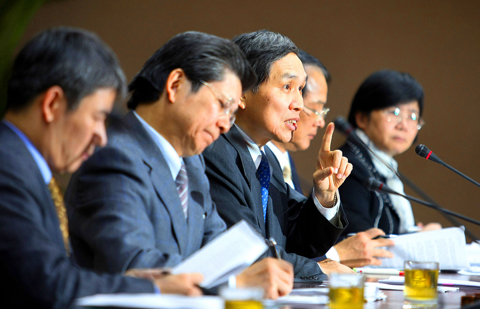Taiwan’s request to sign a trade-enhancement agreement (TEA) with the EU didn’t see much progress in WTO ministerial talks after Swedish trade minister Ewa Bjorling said Taiwan could not be included in the near-term agenda.
Bjorling said the EU has a number of FTA talks pending with ASEAN and the Gulf Cooperation Council, and Taiwan’s request couldn’t be discussed now, Minister of Economic Affairs Shih Yen-shiang (施顏祥) told reporters yesterday after concluding his WTO trip.
Shih talked to Bjorling during a meeting at Geneva in the hope of strengthening trade relations between the two sides by signing a TEM or free trade agreement with the EU.

PHOTO: CNA
However, Shih quoted Bjorling as saying Taiwan wouldn’t be included on the agenda for now.
Late in October, European Chamber of Commerce Taipei urged Taiwan to push for TEM negotiations with the EU only after signing the proposed economic cooperation framework agreement (ECFA) with China, which is expected to be inked in the middle of next year.
TRIPLE WIN
The chamber said the trade pact with China would benefit Taiwan’s economy, local businesses and foreign companies considering Taiwan as a springboard to China, and would boost Taiwan’s economy by 3.8 billion euros (US$5.7 billion).
During yesterday’s press briefing, Shih also said a review meeting on opening Taiwan’s major industries to China — including flat panels, semiconductors and petrochemicals — will be held by the end of the month.
He said authorities have completed reports on the industries and the ministry would hold an intra-ministerial meeting this month to finalize the plans.
Taiwanese companies have repeatedly requested that the government allow them to set up more advanced facilities — such as 12-inch fabs — across the Taiwan Strait.
A number of foreign firms have already gained access in China, and Taiwan risks losing out if the restrictions remain.
Separately, the ministry succeeded in helping local industries sign 43 memorandums of understanding (MOUs) with their partners in China, Shih said.
Since last December, the ministry has worked to bridge the divide between Taiwanese and Chinese industries in terms of possible cooperation and standards collaboration to help local firms get a foothold in China’s growing market.
The MOUs include agreements on solar power, automobiles, wind power, precision machinery, light-emitting diodes (LED) and herbal medicine.
ASSOCIATIONS
The MOUs are mostly between cross-strait associations, while benefits for companies in terms of business dollars will be realized after a common standard is finalized between both sides of the Strait, said Wu Ming-ji (吳明機), director-general of the industrial technology department.
Citing LEDs as an example, he said Taiwanese firms could seize the chance to standardize product design and development to gain access to China and other markets.

When an apartment comes up for rent in Germany’s big cities, hundreds of prospective tenants often queue down the street to view it, but the acute shortage of affordable housing is getting scant attention ahead of today’s snap general election. “Housing is one of the main problems for people, but nobody talks about it, nobody takes it seriously,” said Andreas Ibel, president of Build Europe, an association representing housing developers. Migration and the sluggish economy top the list of voters’ concerns, but analysts say housing policy fails to break through as returns on investment take time to register, making the

‘SILVER LINING’: Although the news caused TSMC to fall on the local market, an analyst said that as tariffs are not set to go into effect until April, there is still time for negotiations US President Donald Trump on Tuesday said that he would likely impose tariffs on semiconductor, automobile and pharmaceutical imports of about 25 percent, with an announcement coming as soon as April 2 in a move that would represent a dramatic widening of the US leader’s trade war. “I probably will tell you that on April 2, but it’ll be in the neighborhood of 25 percent,” Trump told reporters at his Mar-a-Lago club when asked about his plan for auto tariffs. Asked about similar levies on pharmaceutical drugs and semiconductors, the president said that “it’ll be 25 percent and higher, and it’ll

NOT TO WORRY: Some people are concerned funds might continue moving out of the country, but the central bank said financial account outflows are not unusual in Taiwan Taiwan’s outbound investments hit a new high last year due to investments made by contract chipmaker Taiwan Semiconductor Manufacturing Co (TSMC, 台積電) and other major manufacturers to boost global expansion, the central bank said on Thursday. The net increase in outbound investments last year reached a record US$21.05 billion, while the net increase in outbound investments by Taiwanese residents reached a record US$31.98 billion, central bank data showed. Chen Fei-wen (陳斐紋), deputy director of the central bank’s Department of Economic Research, said the increase was largely due to TSMC’s efforts to expand production in the US and Japan. Investments by Vanguard International

WARNING SHOT: The US president has threatened to impose 25 percent tariffs on all imported vehicles, and similar or higher duties on pharmaceuticals and semiconductors US President Donald Trump on Wednesday suggested that a trade deal with China was “possible” — a key target in the US leader’s tariffs policy. The US in 2020 had already agreed to “a great trade deal with China” and a new deal was “possible,” Trump said. Trump said he expected Chinese President Xi Jinping (習近平) to visit the US, without giving a timeline for his trip. Trump also said that he was talking to China about TikTok, as the US seeks to broker a sale of the popular app owned by Chinese firm ByteDance Ltd (字節跳動). Trump last week said that he had